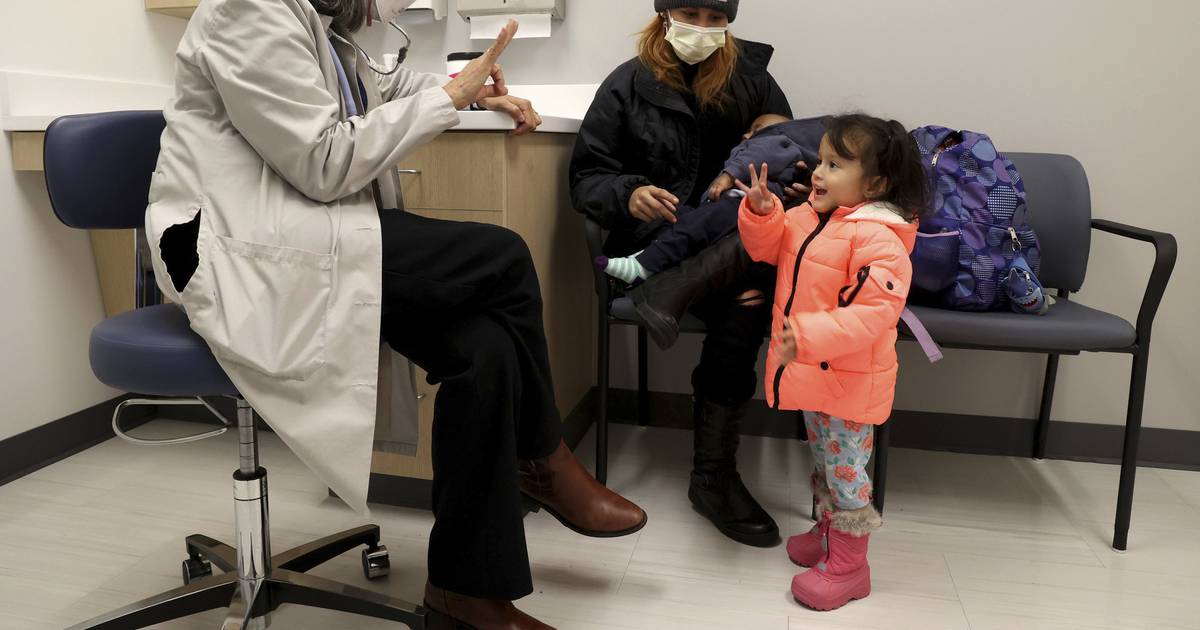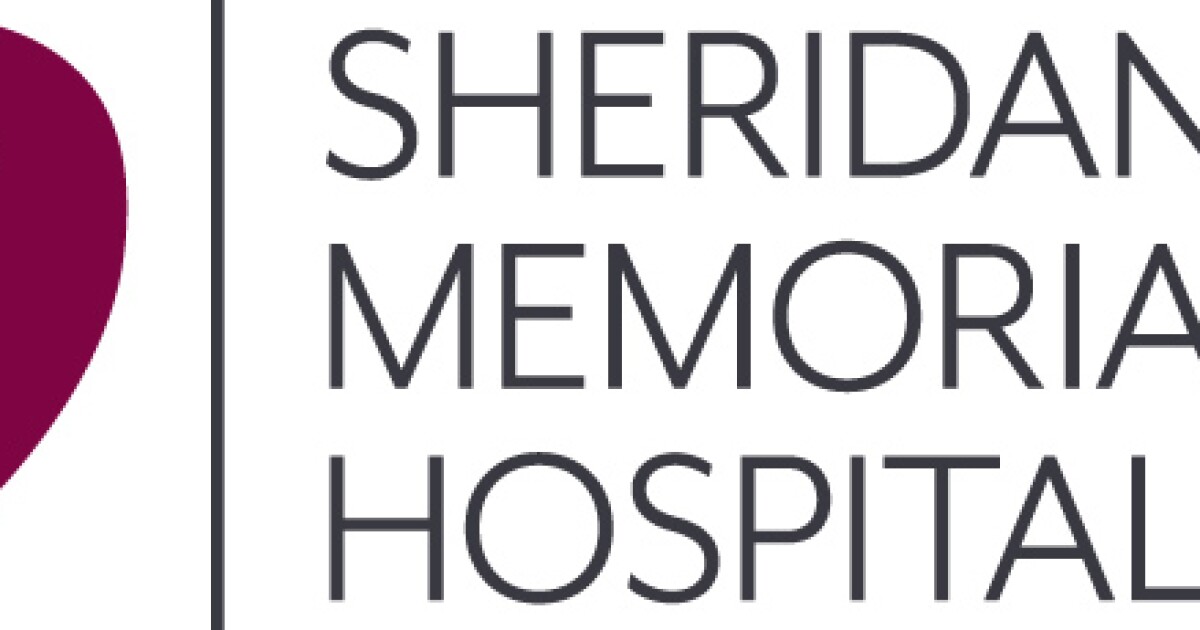[ad_1]
On a cold December day, a little over 50 years ago, Pilar Guerrero arrived in this country from Mexico with her parents by her side. She was 9 years old, she recalled, and didn’t know a bit of English.
Guerrero, now a family doctor, smiled as she sat across from a young girl and her mother, and then proceeded with their checkup. The girl and her mother are among the newly arrived migrants in Chicago from South and Central America.
“I can kind of mirror myself in them,” Guerrero said. “These young parents are so courageous to do whatever they can to provide their kid and themselves a better life.”
In the late summer months, when the first buses of migrants from Texas began to arrive in Chicago, Guerrero volunteered to work in the clinic and medical care program established by Stroger Hospital of Cook County to provide necessary and urgent care to the migrants as part of the city and state efforts to ensure their well-being.
For Guerrero, who is getting ready to retire after working as an emergency room doctor at Stroger Hospital for two decades, it was personal. “It’s like a full circle,” she said. It’s a chance to give back after achieving a dream that seemed distant when she was brought to this country.
Beyond serving as their physician, when she meets young girls, Guerrero instinctively reminds them that they are now in a place where they can learn English and that “opportunities are there, because they were for me.”
For many health care workers who are immigrants — or children of immigrants — tending to the migrants empowers them to continue their work and helps to plant in the migrants a seed of hope for their future in this country, despite the uncertainty they face.
“It’s a way of injecting hope into them,” Guerrero said.
:quality(70)/cloudfront-us-east-1.images.arcpublishing.com/tronc/26NIM4ZSPVFAXOVWZ4L4UALCWM.jpg)
:quality(70)/cloudfront-us-east-1.images.arcpublishing.com/tronc/4UWB3RPNBRCKNPT53YSM7QJDGE.jpg)
After working as a registered nurse for six years, Guerrero decided to purse a medical degree from the University of Michigan Medical School, followed by an emergency medicine residency at Kings County Hospital/SUNY Downstate in New York and completed a one-year research fellowship in the Department of Emergency Medicine at Johns Hopkins Hospital in Baltimore.
She credits the sacrifice of parents, friends, teachers and neighbors. “I was able to attain dreams that I never even imagined. So I see these kids, I see so much potential in their young lives,” she said.
So when 2-year-old Yansa Torres attempted to play with her stethoscope, she let her. Yansa arrived with her 11-month-old brother and their mother, Darling Vielma, from Venezuela a little over a month ago.
Through the journey north, the mother did not have enough money to buy food for her children, so when they arrived in Chicago, the two kids were malnourished and sick, Vielma said.
“I worried that instead of bringing them safety, I was hurting them,” Vielma said in Spanish. Like thousands of Venezuelans, Vielma said she left her country in search of a stable job to provide a better education for her children.
When she got to Chicago and was taken to the clinic, she was grateful. “It was a blessing. I wasn’t expecting it,” she said.
Her two children are now at a healthy weight and regularly visit for follow-ups.
Stroger leaders and staff established the clinic within a day after city and state officials requested their help to provide medical care to the migrants arriving in Chicago on buses sent by Texas Gov. Greg Abbott, said Iliana Mora, who oversees the program that also provides preventive and follow-up care to migrants throughout Chicago and those who have been temporarily placed in suburban shelters and hotels.
Since its inception, there have been over 9,000 clinic visits, a reflection of the number of buses that have arrived at Chicago’s Union Station since the summer. More than 3,500 people are now patients of the clinic, including nearly 1,000 children and 35 pregnant women.
Aside from providing physicals required as part of their asylum case with immigration authorities, migrants can also get medication, care for chronic illnesses, eyesight and hearing exams, and school physicals for children. At the site, there are also mental health resources and staff members who help the migrants sign up for health insurance.
“Health is not always kept at the forefront. It is often not a priority for immigrants,” said Mora, a daughter of Colombian parents who arrived in the U.S. in the ’70s.
Most migrants are solely focused on finding a livelihood that would make their journey, struggle and pain worth it, she said.
“But health is critically important to their livelihood and their ability to contribute to the economy and for their families,” Mora said.
Mora, who mobilized the staff at Stroger to create a team to establish the services at the clinic, said that it was essential to include doctors and other health care leaders who are bilingual and bicultural.
“These people have been through so much; they deserve respect and dignity,” Guerrero said. “At the clinic, you’re not just a medical provider but you are also opening up your culture to them and your heart because they can identify because they know you know what it is like to be Lantinx.”
For Israel Rocha, chief executive officer for Cook County Health, the project is healing. He said it’s rewarding to be able to provide comfort and assistance to the newly arrived migrants amid so much turmoil in their lives.
Rene Munoz, site manager of the clinic, said health care is a human right and it supersedes any political rhetoric around migration.
Munoz has seen first hand how the eyes of pregnant women and mothers light up when they walk into the clinic knowing that there are doctors who will help them.
For many migrants, access to health care — or at least proper access — was not available in their home countries.
Silvia Gaby Calderon is 33 weeks pregnant. She left Peru with her husband and their 1-year old daughter. The rewards of making that journey outweighed the risk of staying in Peru, where they lost their jobs and had barely any food.
“We did it for our children,” Calderon said in Spanish.
Guerrero met her to get her ready for labor in a few weeks.
“Having (doctors) has been a blessing,” Calderon said.
Like Guerrero, Muñoz gets emotional when he sees families with young children. It reminds him of his own children — and it makes him nostalgic about his own immigration story.
His said his parents left their native town of Jalisco, Mexico, and crossed the border unauthorized, holding him in their arms. He was 2 years old. They were undocumented until his father attained permanent residency through an amnesty program in 1986.
His family, he said, did it all alone. So working with migrants now is important for him.
“To sort of let them know that we’re here to help, that they’re not doing it alone like we did 35 years ago,” he said. “And that there are people that know their struggle and know their stories. And that look like them, that speak their language.”
[ad_2]
Source link




